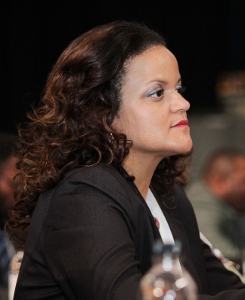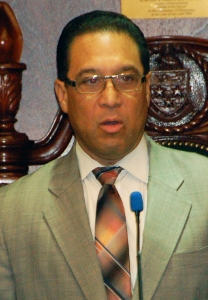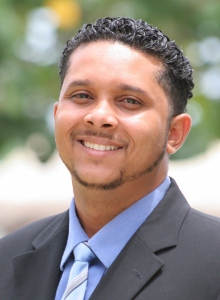Archive for November 15th, 2013

Petition appeal thrown out
 (CNS): The Cayman Islands Court of Appeal has refused to hear an application against the chief justice's decision in relation to a challenge to the election of the education minister to her West Bay seat. Despite the arguments put forward by the legal team representing John Hewitt, who filed the original failed petition against Tara Rivers, that the decision was not in accordance with the law, the higher court found that they did not have jurisdiction. According to the Cayman Constitution 2009, the decision of the Grand Court is final when it comes to an election petition and the appeal court was unsympathetic to Hewitt's attorneys' position that the CJ had misinterpreted the constitution to such an extent that there had to be grounds of appeal.
(CNS): The Cayman Islands Court of Appeal has refused to hear an application against the chief justice's decision in relation to a challenge to the election of the education minister to her West Bay seat. Despite the arguments put forward by the legal team representing John Hewitt, who filed the original failed petition against Tara Rivers, that the decision was not in accordance with the law, the higher court found that they did not have jurisdiction. According to the Cayman Constitution 2009, the decision of the Grand Court is final when it comes to an election petition and the appeal court was unsympathetic to Hewitt's attorneys' position that the CJ had misinterpreted the constitution to such an extent that there had to be grounds of appeal.
After pointing out that the appellant had a high hurdle to cross, the three judges struck out the appeal and stated that they would deliver their reasoning in full before the end of the session.
The judges grappled with the question of the Grand Court decision being the final decision in circumstances where a Grand Court judge had decided unlawfully, but they appeared satisfied that finality in this case stopped at the local court.
Graham Hampson, who was representing Tara Rivers at the appeal, made an application for costs, as did the Reshma Sharma from the Attorney General's Chambers. Hampson explained that costs had not been settled in the previous case as the chief justice had indicated that he did not necessarily think an order was appropriate in the original petition but that remained undetermined.
The Court of Appeal agreed to costs for Rivers but told the AG's attorney that it was a public interest issue and the attorney general's appearance should be borne by the public purse.
The appeal court ruling settles the matter of whether or not Rivers was duly elected. As such, it also confirms the CJ's ruling that Rivers was attending an educational institution for the purposes of study when she was working as an associate lawyer with Alan Overy and that her possession and use of an American passport and her dual nationality does not constitute allegiance to another country.
This opens the door for future candidates previously excluded as a result of dual nationality or for those who have been overseas during the prescribed period before an election to still run if they can demonstrate that they had embarked of some form of training or education during their absence.

CO2 emissions driving oceans ‘acid trip’
 (BBC):The world's oceans are becoming acidic at an 'unprecedented rate' and may be souring more rapidly than at any time in the past 300 million years.In their strongest statement yet on this issue, scientists say acidification could increase by 170% by 2100. They say that some 30% of ocean species are unlikely to survive in these conditions. The researchers conclude that human emissions of CO2 are clearly to blame. The study will be presented at global climate talks in Poland next week. In 2012, over 500 of the world's leading experts on ocean acidification gathered in California. Led by the International Biosphere-Geosphere Programme, a review of the state of the science has now been published.
(BBC):The world's oceans are becoming acidic at an 'unprecedented rate' and may be souring more rapidly than at any time in the past 300 million years.In their strongest statement yet on this issue, scientists say acidification could increase by 170% by 2100. They say that some 30% of ocean species are unlikely to survive in these conditions. The researchers conclude that human emissions of CO2 are clearly to blame. The study will be presented at global climate talks in Poland next week. In 2012, over 500 of the world's leading experts on ocean acidification gathered in California. Led by the International Biosphere-Geosphere Programme, a review of the state of the science has now been published.
This Summary for Policymakers states with "very high confidence" that increasing acidification is caused by human activities which are adding 24 million tonnes of CO2 to oceans every day. The addition of so much carbon has altered the chemistry of the waters. Since the start of the industrial revolution, the waters have become 26% more acidic.
"This is the state of the art," said Prof Jean-Pierre Gattuso, from CNRS, the French national research agency. "My colleagues have not found in the geological record, rates of change that are faster than the ones we see today."
What worries the scientists is the potential impact on many ocean species including corals.

Government begins process for cruise port EIA
(CNS): Plans to develop cruise berthing facilities are moving steadily forward, in compliance with the terms of the fiscal deal government signed with the UK and international best practice. The next step is the environmental impact assessment (EIA), and given the findings in the strategic business case undertaken by PricewaterhouseCoopers that pointed to significant environmental risks and the potential damage to coral and Grand Cayman’s world famous Seven Mile Beach, the EIA is of particular importance. Government has stated that if the EIA found that there was too much risk to the environment associated with the project, it could reconsider its position or work to mitigate those risks.
With the EIA being the next step in the process, the government is hosting another public meeting next week at the Mary Miller Hall to allow public input regarding the Terms of Reference (ToR) for the proposed EIA. The TOR outlines the envisaged technical approach for the EIA. They have been developed by Mott Macdonald as part of the Outline Business Case process, in collaboration with the government’s Environmental Advisory Board, which includes representatives from Departments of Environment, Planning, Tourism, the Port Authority, the National Museum and the National Roads Authority.
Government is seeking public input on the planned assessment and is asking interested parties to review the ToRS and join them for the open house session on Wednesday 20 November from 6pm for the discussion, which will be followed by a presentation.
Comments on the ToR may be submitted in writing at the meeting, electronically via e-mail to doe@gov.ky or mailed to Department of Environment PO Box 10202, Grand Cayman KY1-1002, or hand delivered to Department of Environment, Environmental Centre, 580 North Sound Road, George Town, Grand Cayman. The comment period will officially close at 9am on Monday, 2 December.
The ToR are available online at www.doe.ky and hard copies can be reviewed at the main government building on Elgin Avenue, George Town, or at the Department of Environment’s offices at 580 North Sound Road, George Town. The document is also attached below.

Premier presses for parliamentary independence
 (CNS): The country’s seat of democracy is still controlled by the deputy governor’s office, but Premier Alden McLaughlin believes that needs to change and is pressing for the independence of the Legislative Assembly from the administrative arm of government. Speaking at a special seminar organised by the local branch of the Commonwealth Parliamentary Association (CPA) designed to help MLAs better understand parliamentary procedure and rules at the Legislative Assembly, McLaughlin said that the Standing Orders, the regulations that govern the procedures, need to be modernised. The seminar offered an opportunity for MLAs to discuss making the LA an autonomous body and removing the direct link to the civil service.
(CNS): The country’s seat of democracy is still controlled by the deputy governor’s office, but Premier Alden McLaughlin believes that needs to change and is pressing for the independence of the Legislative Assembly from the administrative arm of government. Speaking at a special seminar organised by the local branch of the Commonwealth Parliamentary Association (CPA) designed to help MLAs better understand parliamentary procedure and rules at the Legislative Assembly, McLaughlin said that the Standing Orders, the regulations that govern the procedures, need to be modernised. The seminar offered an opportunity for MLAs to discuss making the LA an autonomous body and removing the direct link to the civil service.
Ezzard Miller, the independent member for North Side, said that the three elements of government — the parliament that makes the laws, the civil service which implements them and the judiciary which upholds them — had to function independently and separately from each other, so it was wrong for the executive arm of government to control the management and budget of the legislature.
The members of the LA were offered presentations from local attorney Steve McField, and overseas contributors included Speaker of the Trinidad and Tobago House of Representatives, Wade Mark; Speaker of Bermuda’s House of Assembly, Randolph Horton; Speaker of Dominica’s House of Representatives, Alix Boyd-Knight; and Clerk of Jamaica’s Houses of Parliament, Heather Cooke.
Cayman’s own speaker, Julianna O’Connor Connolly, also took part in the presentations. Senior MLAs provided tips and assistance to the new members, adding value to the discussions and debates emanating from the proceedings.
The CPA Secretariat’s Assistant Director of Communications and Research, Arlene Bussette, summed up the purpose of the two-day session. She said the core CPA programme aims to build capacity in newly elected MLAs to help them meet their democratic duties effectively and efficiently, while also serving as a refresher course for returning parliamentarians.

Tourism boss departs for mystery new career
 (CNS): The man credited with turning Cayman’s declining overnight tourism visitors around to record highs over the past few years is leaving government to pursue a new undisclosed career in the private sector. Shomari Scott, who through the clever use of internet and social media, among other initiatives, moved a ten percent fall to a more than 23% increase after taking the top job in an acting capacity in 2009, has resigned from the director’s post at the Department of Tourism. He will be leaving at the end of December, leaving Rosa Harris and Oneisha Richards joint acting directors. "There is never perfect timing to move on,” Scott said in a release announcing his departure.
(CNS): The man credited with turning Cayman’s declining overnight tourism visitors around to record highs over the past few years is leaving government to pursue a new undisclosed career in the private sector. Shomari Scott, who through the clever use of internet and social media, among other initiatives, moved a ten percent fall to a more than 23% increase after taking the top job in an acting capacity in 2009, has resigned from the director’s post at the Department of Tourism. He will be leaving at the end of December, leaving Rosa Harris and Oneisha Richards joint acting directors. "There is never perfect timing to move on,” Scott said in a release announcing his departure.
“However the team at the CIDOT has been built to be strategic, innovative and result driven and I am therefore confident that they will take the department to even greater heights,” he added. “After more than a decade in government service within the tourism industry, and with the accomplishments the team has helped to achieve, it is time for me to further my professional career by pursuing another opportunity that gets me just as excited as tourism, and also stays in line with working for good of the country.”
Scott was the department’s first intern in 1996. After completing his studies at Stetson University in 2002, he returned tothe Cayman Islands and joined the DoT full time, where he has worked for the last 11 years. During his tenure he rose through the ranks, working in 5 different positions, from events coordinator through to director. He took over the helm as acting director in 2009 during one of the worst economic recessions in modern history, when stay-over tourism arrivals had decreased by 10 percent. With the assistance of a strong internal management team and his marketing skills, he presided over a dramatic increase of 23 percent in the 4 years that followed.
Moses Kirkconnell, Deputy Premier and Tourism Minister, said Scott’s departure was a huge loss to the industry and to government.
“However I am pleased that he is staying within the Cayman Islands and will continue to focus his efforts towards the ultimate goal of increasing the economic benefits for the people of the Cayman Islands,” he said, without hinting what Scott had chosen to do.
“He has my full support and I wish him all the best in this new chapter of his life. The ministry and I also have full confidence in the senior leadership team that has been established at the CIDOT and anticipate as seamless a transition as can be expected."
Chief Officer for the ministry, Stran Bodden, said it had been an absolute pleasure to work with Scott, adding that the deputy directors would share the responsibility for managing the department until the prescribed recruitment process was complete.

Gunman’s 15 year sentence sticks
(CNS): Matio Dinnall’s appeal against his fifteen year sentence was denied this week, when the Cayman Islands Court of Appeal upheld the sentence he is currently serving for possession of an unlicensed firearm with intent. Dinnall was jailed eight years ago and will not be eligible for parole for at least two more years now that the sentence has been confirmed. The attempt to get his sentence reduced was Dinnall’s third appeal since his conviction in 2005 for a gang-related shooting in Bodden Town and was based on the fact that the judge’s starting point had been too high, since at the time of his conviction the mandatory ten year minimum sentence did not apply and the judge should have started his calculations at a lower point.
However, the appeal court judges disagreed and said that there was no indication that the judge should not have started the sentence where it was, as they pointed out that the chief justice’s guidelines had provided for a sentencing tariff of ten years in any event before the mandatory sentence was introduced.
With a maximum possible jail term of twenty years, given the circumstances of the crime and Dinnall’s previous convictions, the appeal court said the sentence was appropriate. The higher court said there was nothing to indicate that the sentencing judge was influenced by ten year minimum. The appeal court judges said that was the starting point he chose, not because it wasimposed, as they reconfirmed Dinnall’s jail time.
Dinnall, who was just 21 when he was convicted following ajudge alone trial, was found guilty of firing a nine millimetre handgun multiple times at a residence in Carrington Lane in Pease Bay, Bodden Town, with another man.
Although the property, which was the home of Carlos Russell, was damaged in the incident, no one was injured but there were four people including a two year old child in the house at the time. Following the incident, Russell was convicted of the manslaughter of Phillip Watler, the second man alleged to have been involved in the shooting, after he was shot and killed at the George Town hospital.